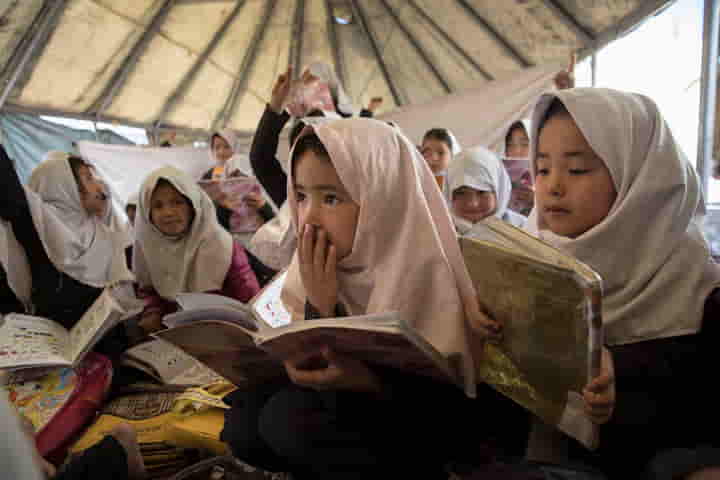With the Taliban now lording over Afghanistan, there is a genuine concern about the rights of women there and also how the issue of gender parity will be dealt with. In fact, many women activists around the world have been flagging this aspect.
Malala Yousafzai, winner of Nobel Peace Prize in 2014, expressed her concern and worry for the safety of women, human rights advocates and minorities.
Taking to Twitter she wrote: "We watch in complete shock as the Taliban takes control of Afghanistan. I am deeply worried about women, minorities and human rights advocates. Global, regional and local powers must call for an immediate ceasefire, provide urgent humanitarian aid and protect refugees and civilians.”
It may be recalled that Yousafzai, who is based in the United Kingdom, was shot in the head by Taliban terrorists in Pakistan in December 2012 during her campaign for female education in the Swat Valley in northeastern region. She has urged the world and regional leaders to call for a ceasefire and also provide help to civilians.

Malalala Yousufzai (Pic. Courtesy asianew.it)
The Taliban known for their conservative and hard stance on the issue of gender parity had in their earlier period of governance of Afghanistan, kept girls out of schools. Opponents and Western countries accuse the Taliban of wanting to return to their medieval style of governance. During the earlier Taliban rule from 1996-2001, women were barred from working or studying, and were confined to their homes unless accompanied by a male guardian. It was also mandatory for them to wear a burqa.
This time they are expected to portray a different picture. According to a report in india.com, the group after the fall of Kabul said that they will respect the rights of women but they will have to wear the hijab (a religious veil worn by Muslim and Mandaean women in the presence of any male outside of their immediate family) when in public.
The spokesperson of the group, Suhail Shaheen stressing this point said: “We will respect the rights of women. Our policy is that women will have access to education and work, to wear the hijab.”
He went to add that media will be allowed to criticize anyone, but character assassination won’t be tolerated. Moreover, the spokesperson said that courts will decide policy on punishments.
Also read: What you need to know about the Taliban
Contrary to his assurance the Afghanistan woman MP Farzana Elham told BBC from Kabul on Sunday that everyone is very scared, especially the women. The Taliban have already been telling women, in the areas under their control, to not go for work and that girls should not go to school, she added.
CNN’s Chief International Correspondent Clarissa Ward has reported that Afghan scribes were "absolutely petrified, particularly women journalists".
She told CNN’s Brian Stelter: "There are so many of them across the country, and they've been doing bold and incredible reporting for many years. And now there is a very real fear that they might face retaliation for that or that, certainly, they won't be able to do their work anymore.” She added: "Some of these journalists and reporters know that they have a big 'X' on their backs, that they're big targets because they have been so outspoken against the Taliban in the past.”
On the issue of Taliban stating that it will adopt a moderate posture this time she said: “And while the Taliban is trying to adopt this much more mature tone and pragmatic tone in saying that they are not going to hurt anybody, that they want things to be peaceful, that there will be no retaliation, there is also the reality on the ground that when you have a bunch of fighters roaming around, things can very quickly get out of control.”
The United Nations Secretary-General Antonio Guterres reported to be “deeply disturbed” by Taliban’s imposing severe restrictions on human rights in the areas under their control, particularly targeting women and journalists had issued a statement which said: “It is particularly horrifying and heart-breaking to see reports of the hard-won rights of Afghan girls and women being ripped away from them.”
Also read: Afghan humanitarian crisis grows bigger with Kabul under the Taliban
The UN has called on the Taliban to protect the “hard-won rights of women and girls,” as the militants have taken over Kabul to establish complete control over Afghanistan.
Guterres in a statement urged “the Taliban and all other parties to exercise utmost restraint in order to protect lives and ensure that humanitarian needs can be addressed.”
He was "particularly concerned about the future of women and girls, whose hard-won rights must be protected," the statement added.
This fear expressed by individuals and organisations about discrimination against women was voiced by women's rights and children activist Mariam Atahi. She told dw.com last week that she was afraid the Taliban "will come and kill me". She said feared being punished “because for the last 20 years, I advocated for women's rights," going against Taliban "ideologies and thoughts."
Talking about women she said: "Afghan women especially, who have gone through so much during the Taliban regime, are scared about what will happen."




















